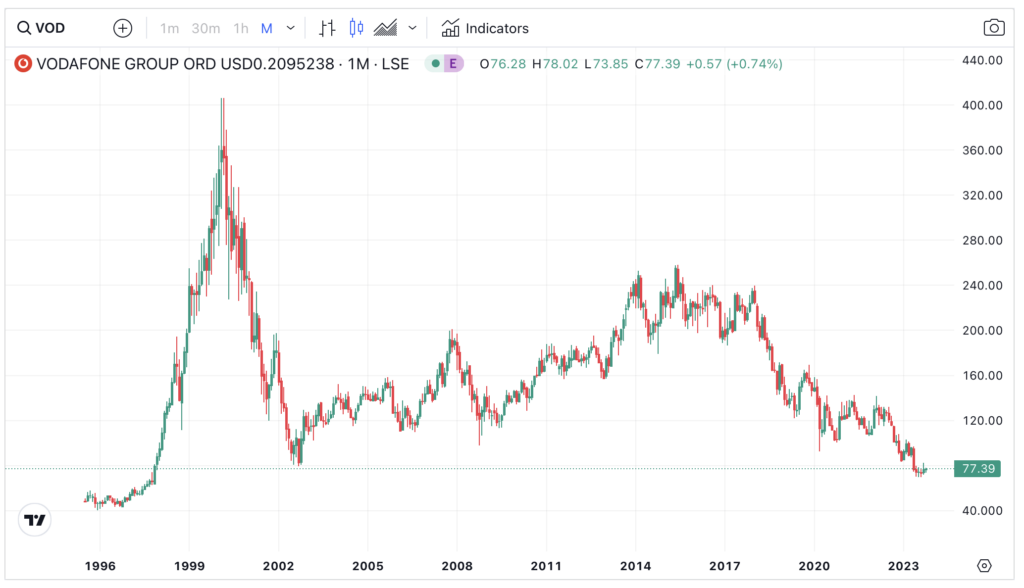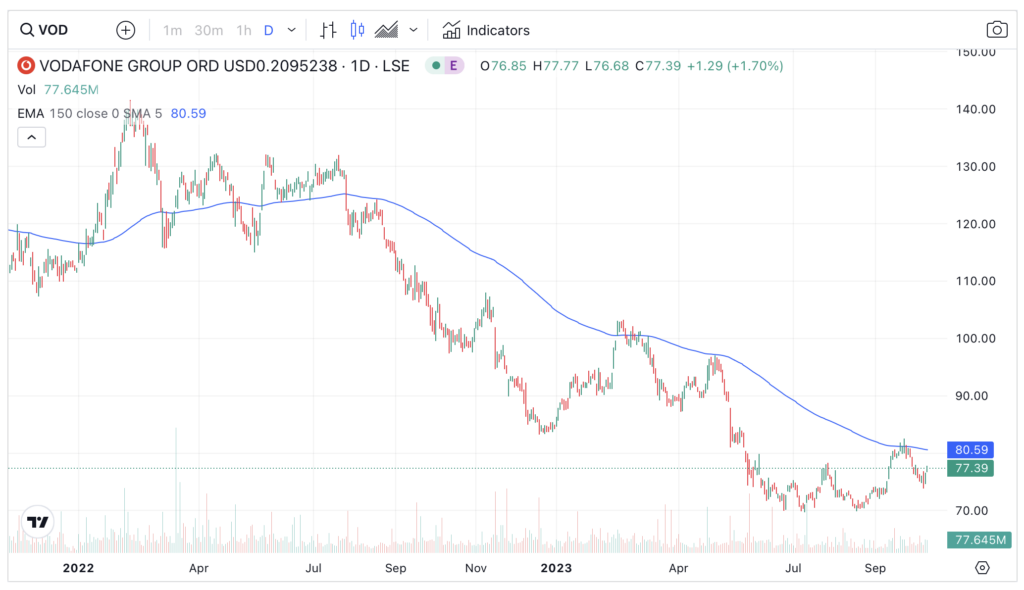Vodafone shares have halved over the last five years. The share price is down over 20% over the last 12 months and down 10% since the start of the year. In this analysis, I look at whether or not the Vodafone share price can recover and if it can get back to its trading channel around the £2 mark.
How have Vodafone shares performed historically?
For those trading the frenzied Dot-Com boom in the nineties, who could forget Vodafone? Once the world’s largest cellular company, Vodafone was a big-shot on both sides of the Atlantic. As the twentieth century drew to a close, Vodafone under the charismatic Chris Gent rode the TMT bubble to the hilt.
During the year 1999, the British company first bought AirTouch Communications for $56 billion. A few months later, it executed the-then largest merger in history with Mannesmann AG – for an unheard of $190 billion! Heady valuation, easy credit and uber bullish sentiment sent Vodafone’s shares soaring to the moon.
Then, Vodafone suffered a twenty-year hangover.
In 2000, VOD’s share price topped 400p (US ADR exceeding $70). Now? A depressing 75p. Investors who bought during the nineties bubble (above 300p) may have yet to recoup their capital (excluding dividends).
Two cyclical bull markets (2003-2007, 2009-2015) had failed to carry the stock back to its lofty highs. These days, Vodafone’s market valuation is a mere £20 billion – a far cry from its $227 billion market valuation on March 2001.

What causes the market to place such a low valuation on Vodafone? There are a few reasons for this downbeat outlook.
The first is growth. If you trawled back Vodafone’s revenue trend over the years, you will find that it is now operating in a low-growth business. In 2001, for example, Vodafone reported revenue of £21 billion and pre-tax profit of £4 billion. Back then, few companies could match that elevated level of income and earnings.
Is Vodafone impressing investors?
Fast forward to 2022. Vodafone’s annual revenue is at euro 42 billion; pre-tax profits remains at euro 4 billion. More importantly, net debt has ballooned to euro 41 billion. Admittedly, this dropped to euro 33 billion once gains on asset disposal were used to retire some debt.
Investors are clearly not impressed with Vodafone.
Moreover, as interest rate rises, the financial burden of this debt will increase. The company will need to earn more just to carry the same level of debt.
The last point is that the whole sector (telecom) is viewed as a debt-laden utility industry. Low growth; huge debt burdens. Just not a great place to park your capital. And the merger of Vodafone’s UK business with Three (Hutchison) did not excite investors much.
All in all, Vodafone is fighting to regain relevance in a fast-changing communication market. Its share is unlikely to recover to its 2000 highs because that period was a unique ‘one-off’.
Bearish technical outlook
When we take a closer look at Vodafone’s chart, its short- and medium-trends are bearish, too.
The stock broke the long-term moving average indicator a year ago (150-day moving average) and has been trading lower ever since. Three times the stock rallied back to this trend line and failed to break north. That tells you that investors are not in a mood to acquire more Vodafone shares.
From the trading perspective, however, the company is forming a little base off the 70p support. Tentative buying is occurring at that level since late June; buying that may support another probe of the 80p resistance (see below).
Only when this 70p ceiling is broken through could we point to a healthier chart and a potential recovery.


Jackson is a core part of the editorial team at GoodMoneyGuide.com.
With over 15 years industry experience as a financial analyst, he brings a wealth of knowledge and expertise to our content and readers.
Previously Jackson was the director of Stockcube Research as Head of Investors Intelligence. This pivotal role involved providing market timing advice and research to some of the world’s largest institutions and hedge funds.
Jackson brings a huge amount of expertise in areas as diverse as global macroeconomic investment strategy, statistical backtesting, asset allocation, and cross-asset research.
Jackson has a PhD in Finance from Durham University and has authored nearly 200 articles for GoodMoneyGuide.com.


